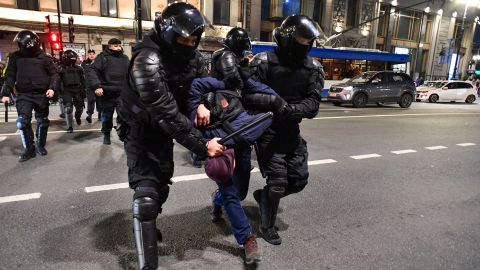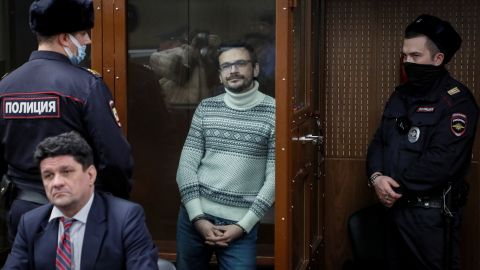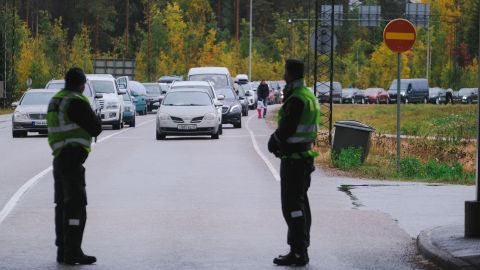CNN
—
For Andrei Soldatov and his friends, February 24 marked the end of Russia as they knew it.
In the early hours of the same day, Russian President Vladimir Putin announced that he had ordered Russian troops to enter Ukraine. “Suddenly, everything we still believed in was completely compromised,” Soldatova Russian investigative reporter living in self-imposed exile in London, told CNN.
Life in Russia has become increasingly difficult for dissidents, independent journalists and anyone opposed to Putin’s regime over the years, but Soldatov said there is still hope for people like him to persevere. The war changed that, he said.
“Life under Putin is horrible, it’s so far from the idea of democracy, but you still have established institutions, you almost think they’re going to exist anyway, and all of a sudden, everything falls apart,” he said, referring to What is most striking is the near-total elimination of any remaining independent media, civil society and human rights groups.
A woman still living in Moscow (CNN calls her Olga) described February 24 as a day of no return. “Life has become a nightmare from which you cannot wake up, reading the news 24/7, with security forces outnumbering civilians at the protests,” she told CNN via an encrypted messaging service, describing the shame and the despair she felt. “The aggressor is our country. In our name, in my name, this terrible massacre is taking place,” she said.
CNN did not release the woman’s name and used a pseudonym at her request because it posed a threat to her personal safety. Speaking to foreign journalists about her involvement in the demonstrations — even using the word “war” instead of the Kremlin-approved term “special military operations” — put her at risk of arrest and a possible lengthy prison sentence.
Despite the impression given by Russian state media that Russians support the war and Putin, many of the country’s freer, better-educated and better-traveled citizens have reacted to the violence their country has inflicted on Ukraine over the past nine months Shocked.

But with the regime increasingly cracking down on any sign of dissent, dissidents have limited options.
Thousands of Russians have left the country, some out of principle or because they face persecution, others to avoid Western sanctions or the risk of being drafted into the military. Thousands have been detained, according to human rights groups. Many others were forced out of public life or lost their jobs after hundreds of Western companies pulled out of Russia and many local and foreign NGOs and campaign groups were shut down.
The crackdown on dissent has been brutal. According to independent human rights monitor OVD-Info, more than 19,400 people have been detained for protesting the war in Russia, with dozens being prosecuted every week under a new law that stipulates spreading “false” stories about the invasion Information is illegal.
Earlier this month, a Moscow court invoked the law to sentence Kremlin critic Ilya Yashin to more than eight years in prison for speaking out about the killing of civilians by Russian troops in the Ukrainian town of Buta, outside Kyiv. accused. The Kremlin has denied any involvement in the mass killings, while reiterating baseless claims that images of civilian corpses are fake.
Soldatov received an official letter from Russian authorities in London detailing the criminal charges against him.
Along with Yassin and hundreds of others, he is accused of spreading disinformation about the Russian military and law enforcement and is now on Russia’s most wanted list. He denied the allegations and said he was simply reporting the truth about the actions of the Russian government before and during the invasion of Ukraine.
Any remnants of a free press since the war began have been wiped out. Western publications and social media sites are blocked online, forcing Russians seeking an alternative to official propaganda to go underground using virtual private networks, or VPNs, which encrypt internet traffic so people can browse the internet freely. Russia’s top eight VPN apps have been downloaded nearly 80 million times in Russia this year, despite government efforts to crack down on use, according to app market research firm Sensortower.

The crackdown has forced many to reconsider their future in Russia. According to official statistics released by the Russian government, more than half a million people left Russia in the first 10 months of this year — more than double the number for all of 2021.
The true number is likely much higher, as many may have left unofficially.
It’s unclear how many left for political reasons, but nearly 50,000 Russian citizens applied for asylum in another country in the first six months of this year, according to UNHCR, the United Nations refugee agency. That’s more than the annual figure for any year in the past 20 years.
U.S. Border Patrol recorded 36,271 contacts with Russian citizens between October 2021 and September 2022. The figure, which includes arrests or deportations by border forces, is significantly higher than the 13,240 and 5,946 recorded in the previous two financial years.
OK Russians, a nonprofit that helps Russian citizens flee persecution, said its survey showed those who left were younger and better educated on average than the general Russian public.
“If you take the liberal intellectuals in Moscow, of course, and I’m just talking about people I know and people I know, I’d say maybe 70 percent left. It’s journalists, it’s university people, there are Sometimes school people, artists, people with clubs and [foundations] It was shut down in Moscow,” Soldatov said.
The numbers leaving Russia pale in comparison to the more than 4.8 million Ukrainians registered as refugees across Europe as a result of the war, but the mass exodus of the mostly educated is having a major impact on Russian society.
“If you’re losing an educated middle class in the population, that’s important for your economic prospects, but it’s also important for the potential political rebuilding of the country,” said Kristina Berziner, a Russia expert at the German Marshall Fund. United States. She cites the exodus of liberal, educated Iranians after the country’s 1979 revolution as an example of what happens when large numbers of such people leave the country.
“You don’t need to have an entirely radicalized population to support a radical regime,” she said.
Maria had only one friend left in Moscow. Others fled after President Vladimir Putin decided to invade Ukraine.
“They all left in early March,” she said. “[For them] It is impossible to live in a country that wages war. ”
Maria asked CNN not to release her full name or details of her employer for personal safety. The NGO where Maria works is considered a foreign agent under Russia’s recently expanded foreign agents law, meaning she risks persecution.
“Everyone who was against the war saw their lives destroyed,” she told CNN. “We can’t complain now because someone will tell you immediately – and quite reasonably – that no one is interested in you now. It is the Ukrainians who suffer the most. Of course, they are in a worse situation now. But that doesn’t mean We’re fine.”
Maria said she was still determined to stay in Russia, even though all her friends and son had left. Her aging mother couldn’t – and didn’t want to – travel abroad, and Maria was reluctant to leave her. “It might have been easier for me to leave if I was sure the border wouldn’t close and that I could come over whenever my mom needed my help. But knowing that something else could happen at any moment scares me,” she told CNN.
She still believes her work matters, but says she is struggling with no hope for the future. Like Olga, she describes her life as a perpetual cycle of panic, fear, shame, and self-doubt.
“You’re constantly torn: Are you to blame? Haven’t you done enough? Could you have done something else, what now?” she said. “There’s no outlook. I’m an adult and I haven’t quite figured out my whole life, but all in all I understand what’s going to happen next. No one understands what’s going on now. People don’t even understand what’s going to happen tomorrow.”
Soldatov said he had begun to question his identity. “Things that we hold dear, such as the memory of World War II, have been completely compromised,” he said, referring to Putin’s baseless claim that Russian troops were “denazifying” Ukraine.
“Russian troops helped win the war (against Hitler’s Germany), which is part of Russia’s national identity and now feels completely wrong because Putin used that message. You start to question history,” he said, adding that a certain part of Russian society These partial favorable responses to the invasion prompted him to study German antebellum rhetoric.
He said referring to the Russians as “us” was starting to feel wrong because he strongly disagreed with Russia’s behavior. But saying “Russian” doesn’t seem right either. “Because of course, I’m Russian and I’m also partly responsible for what’s happening and I don’t want to run away.”

Maria, a historian who has participated in anti-government protests for years, describes herself as a liberal who strongly opposes former KGB agent Putin. “I’ve always known that our country shouldn’t be led by someone from the KGB. It’s deeply rooted in terror and death and all that,” she said.
After the war broke out, she said, she became increasingly apprehensive about attending demonstrations, stopping when it became too dangerous. She said she did not think the Russian regime would be overthrown anytime soon, noting that all opposition leaders “are in prison or killed”.
Berzina said the expectations of some in the West — that “as soon as people start to feel that their leaders are doing something wrong, there will be waves of street protests and calls for government change that will actually have an impact” — do not reflect the Real life in Russia.
“The Putin regime has done a very good job of coercing or imprisoning all viable alternatives in a more democratic fashion, on the other hand, if there’s no clear path forward, you’re afraid to take to the streets,” she said.
Olga, who lives in Moscow and regularly participates in anti-war protests, has also lost hope.
“Almost all opposition leaders and opinion leaders are now in prison or abroad. There is enormous potential for political action, but there is no leader and no power base,” she said, adding that civilians would not stand up against armed forces Police, National Guard and other security forces.
“People in democracies can have a hard time understanding the realities of life in powerful autocracies,” she said. “It’s a horrible feeling of being small and helpless in the face of a gigantic machine of death and madness.”